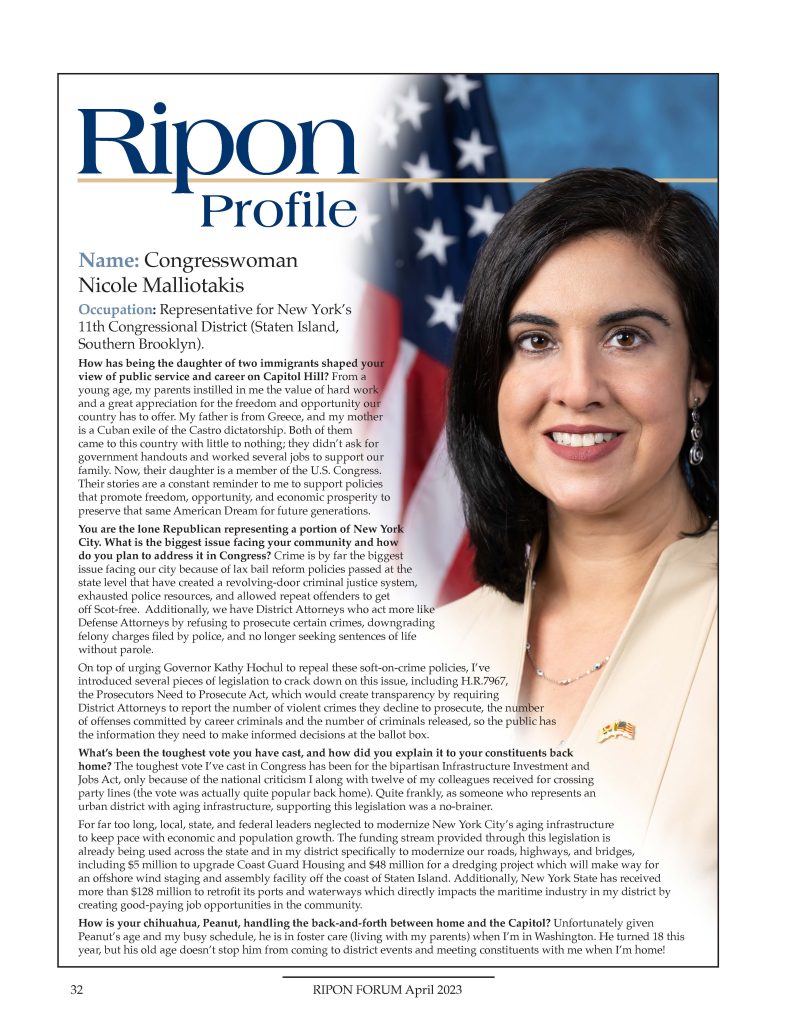
Name and occupation: Congresswoman Nicole Malliotakis, Representative for New York’s 11th Congressional District (Staten Island, Southern Brooklyn).
How has being the daughter of two immigrants shaped your view of public service and career on Capitol Hill? From a young age, my parents instilled in me the value of hard work and a great appreciation for the freedom and opportunity our country has to offer. My father is from Greece, and my mother is a Cuban exile of the Castro dictatorship. Both of them came to this country with little to nothing; they didn’t ask for government handouts and worked several jobs to support our family. Now, their daughter is a member of the U.S. Congress. Their stories are a constant reminder to me to support policies that promote freedom, opportunity, and economic prosperity to preserve that same American Dream for future generations.
You are the lone Republican representing a portion of New York City. What is the biggest issue facing your community and how do you plan to address it in Congress? Crime is by far the biggest issue facing our city because of lax bail reform policies passed at the state level that have created a revolving-door criminal justice system, exhausted police resources, and allowed repeat offenders to get off Scot-free. Additionally, we have District Attorneys who act more like Defense Attorneys by refusing to prosecute certain crimes, downgrading felony charges filed by police, and no longer seeking sentences of life without parole.
On top of urging Governor Kathy Hochul to repeal these soft-on-crime policies, I’ve introduced several pieces of legislation to crack down on this issue, including H.R.7967, the Prosecutors Need to Prosecute Act, which would create transparency by requiring District Attorneys to report the number of violent crimes they decline to prosecute, the number of offenses committed by career criminals and the number of criminals released, so the public has the information they need to make informed decisions at the ballot box. Senator John Kennedy (R-LA) has introduced a companion bill in the U.S. Senate, and I look forward to our continued partnership on this issue to restore law and order in our communities.
What’s been the toughest vote you have cast, and how did you explain it to your constituents back home? The toughest vote I’ve cast in Congress has been for the bipartisan Infrastructure Investment and Jobs Act (IIJA), only because of the national criticism I along with twelve of my colleagues received for crossing party lines (the vote was actually quite popular back home). Quite frankly, as someone who represents an urban district with aging infrastructure, supporting this legislation was a no-brainer.
For far too long, local, state, and federal leaders neglected to modernize New York City’s aging infrastructure to keep pace with economic and population growth. The funding stream provided through this legislation is already being used across the state and in my district specifically to modernize our roads, highways, and bridges, including $5 million to upgrade Coast Guard Housing and $48 million for a dredging project which will make way for an offshore wind staging and assembly facility off the coast of Staten Island. Additionally, New York State has received more than $128 million to retrofit its ports and waterways which directly impacts the maritime industry in my district by creating good-paying job opportunities in the community.
In the future, this funding could be used for new fast ferry lines connecting the city’s five boroughs, upgrading our subway system’s pre-WWII signals, or completing the High-Occupancy Vehicles Lane on the Staten Island Expressway. The city could afford to fortify neighborhoods along our coastline with resiliency projects and expand our sewer systems to deal with the next Superstorm Sandy or Hurricane Ida and reduce the need for the MTA to raid operating funds to pay off debt incurred for capital improvements. Simply put, this investment will not only save my constituents’ time and money, but also their properties and lives.
While the passage of the IIJA was an undisputable victory for New York, it’s only the first step in the long process of addressing our city and state’s infrastructure needs. It is now up to our city and state governments to allocate and prioritize this funding and I will continue to work to ensure they do so appropriately. Additionally, with Republicans now in control of the House, we must conduct oversight and seize opportunities to make the legislation better.
How is your chihuahua, Peanut, handling the back-and-forth between home and the Capitol? Unfortunately given Peanut’s age and my busy schedule, he is in foster care (living with my parents) when I’m in Washington. He turned 18 this year, but his old age doesn’t stop him from coming to district events and meeting constituents with me when I’m home!




